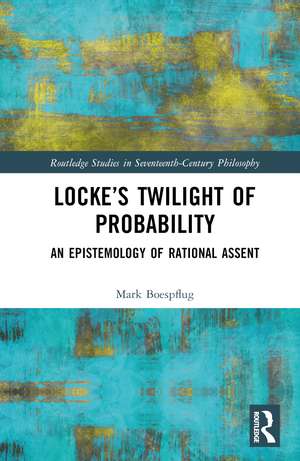Locke’s Twilight of Probability: An Epistemology of Rational Assent: Routledge Studies in Seventeenth-Century Philosophy
Autor Mark Boespflugen Limba Engleză Hardback – 26 oct 2022
There is a powerful case to be made that the most important dimension of Locke’s philosophy is his theory of rational probable assent, rather than his theory of knowledge. According to Locke, we largely live our lives in the “twilight of probability” rather than in “the sunshine of certain knowledge.” Locke’s theory of probable assent has far-reaching significance insofar as it contains a wealth of novel, independently interesting, and prescient elements that precede the modern field of formal epistemology. In this book, the author argues for the central role of probable assent in Locke’s philosophy. Locke’s theory of probable assent is based on an epistemic modesty that claims, roughly, that our cognitive abilities are limited and that we ought to carry ourselves in believing with due caution. This modesty motivates the author’s discussion of other aspects of Locke’s epistemology, notably his principle of proportionality, his doxastic involuntarism, his epistemological pragmatism, and his theory of testimony. The book concludes by connecting the theory of probable assent with Locke’s views on the limits of science, moral epistemology, and the rationality of faith.
Locke’s Twilight of Probability will appeal to scholars and advanced students working on Locke and the history of early modern philosophy.
| Toate formatele și edițiile | Preț | Express |
|---|---|---|
| Paperback (1) | 383.89 lei 6-8 săpt. | |
| Taylor & Francis – 26 aug 2024 | 383.89 lei 6-8 săpt. | |
| Hardback (1) | 892.16 lei 6-8 săpt. | |
| Taylor & Francis – 26 oct 2022 | 892.16 lei 6-8 săpt. |
Din seria Routledge Studies in Seventeenth-Century Philosophy
-
 Preț: 395.93 lei
Preț: 395.93 lei -
 Preț: 391.99 lei
Preț: 391.99 lei -
 Preț: 388.30 lei
Preț: 388.30 lei -
 Preț: 487.37 lei
Preț: 487.37 lei -
 Preț: 385.84 lei
Preț: 385.84 lei -
 Preț: 449.41 lei
Preț: 449.41 lei -
 Preț: 381.00 lei
Preț: 381.00 lei -
 Preț: 412.27 lei
Preț: 412.27 lei - 23%
 Preț: 322.05 lei
Preț: 322.05 lei -
 Preț: 389.66 lei
Preț: 389.66 lei -
 Preț: 467.44 lei
Preț: 467.44 lei -
 Preț: 484.47 lei
Preț: 484.47 lei -
 Preț: 496.35 lei
Preț: 496.35 lei -
 Preț: 389.29 lei
Preț: 389.29 lei -
 Preț: 412.19 lei
Preț: 412.19 lei -
 Preț: 449.41 lei
Preț: 449.41 lei -
 Preț: 385.15 lei
Preț: 385.15 lei -
 Preț: 311.37 lei
Preț: 311.37 lei -
 Preț: 484.47 lei
Preț: 484.47 lei -
 Preț: 384.86 lei
Preț: 384.86 lei -
 Preț: 489.57 lei
Preț: 489.57 lei -
 Preț: 386.61 lei
Preț: 386.61 lei -
 Preț: 325.87 lei
Preț: 325.87 lei -
 Preț: 442.62 lei
Preț: 442.62 lei - 18%
 Preț: 891.36 lei
Preț: 891.36 lei - 18%
 Preț: 1008.80 lei
Preț: 1008.80 lei - 31%
 Preț: 762.97 lei
Preț: 762.97 lei
Preț: 892.16 lei
Preț vechi: 1088.00 lei
-18% Nou
Puncte Express: 1338
Preț estimativ în valută:
170.71€ • 177.89$ • 141.35£
170.71€ • 177.89$ • 141.35£
Carte tipărită la comandă
Livrare economică 03-17 aprilie
Preluare comenzi: 021 569.72.76
Specificații
ISBN-13: 9781032293837
ISBN-10: 1032293837
Pagini: 172
Dimensiuni: 152 x 229 x 11 mm
Greutate: 0.48 kg
Ediția:1
Editura: Taylor & Francis
Colecția Routledge
Seria Routledge Studies in Seventeenth-Century Philosophy
Locul publicării:Oxford, United Kingdom
ISBN-10: 1032293837
Pagini: 172
Dimensiuni: 152 x 229 x 11 mm
Greutate: 0.48 kg
Ediția:1
Editura: Taylor & Francis
Colecția Routledge
Seria Routledge Studies in Seventeenth-Century Philosophy
Locul publicării:Oxford, United Kingdom
Public țintă
Postgraduate and Undergraduate AdvancedCuprins
Introduction
1. Epistemic Modesty in a Twilight World
2. The Candle of Reason
3. Probability and Its Grounds
4. Reason’s Demand: Proportionate Assent
5. The Involuntariness of Assent
6. Uncertain Science
7. The Elusive Knowledge of Morality
8. Faith as Rational Assent
1. Epistemic Modesty in a Twilight World
2. The Candle of Reason
3. Probability and Its Grounds
4. Reason’s Demand: Proportionate Assent
5. The Involuntariness of Assent
6. Uncertain Science
7. The Elusive Knowledge of Morality
8. Faith as Rational Assent
Notă biografică
Mark Boespflug is an Assistant Professor of Philosophy at Fort Lewis College. He is the author of a number of articles including "Locke on Testimony" (British Journal for the History of Philosophy, 2019) and "Why Reid is no Dogmatist" (Synthese, 2019). He completed his Ph.D. in philosophy at the University of Colorado.
Descriere
This book provides a systematic treatment of Locke’s theory of probable assent. It shows how the theory applies to Locke’s philosophy of science, moral epistemology, and religious epistemology.
